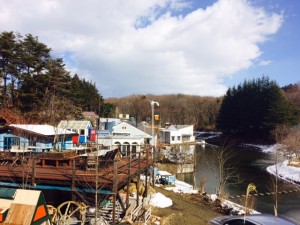
{Our first view of the Hidenka Kobo grounds.}
This week we went on a field trip to a place called Hidenka Kobo (Non-Electric Studio) which is a small family-run business centered around the goal of creating a whole culture of life not based on electricity or mass production/consumption. From what we had heard before actually going, I had expected a factory tour or something of the like, but what we got was (at least for me) totally unexpected. Hidenka Kobo is far from a factory and they don’t even really fit within the confines of what we view as a business either. We pulled up to what seemed to be a small village of eccentric, colorful structures along a small body of water. The quaintness and unexpectedness of this view in addition to the beautiful weather had us all immediately curious and in good spirits. And our initial impressions of eccentricity were then further validated by the presence of a lone free-range chicken (that ended up coming into the house with us), the many jars of beautiful and mysterious preserved foods, the collection of antiques they use for inspiration in their inventing, and the bright orange tree house the 72 year old man who started Hidenka Kobo built for himself.
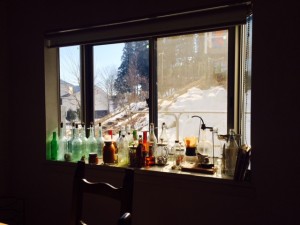
{A collection of bottles that created one of the many beautiful and quirky mosaics on our tour of the grounds.}
At Hidenka Kobo they explore a broad range of alternative methods to living a modern lifestyle and from what we saw and learned about on our tour, their explorations and endeavors break off into two main categories: house/structure building and inventing non-electric appliances/devices for tasks often done with electricity. With their building/construction endeavors they hope to really change the belief that only experts can build houses by developing simpler construction methods that also involve minimal consumption. We saw a few examples of these home-building experiments in our tour. They had wooden structures, but were insulated with rice husks and then coated on the inside and outside with plaster. This easy, less expensive, simple approach to building could really change the mainstream view of how you buy a house, what a house must be like, and how much a house must cost.
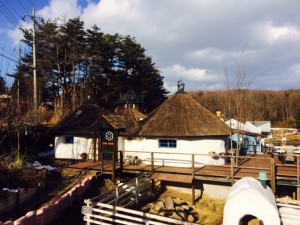
{A cafe built using these alternative methods.}
And their namesake project of course is developing non-electric appliances in order to create what they described as “appropriately convenient” products.They develop these non-electric contraptions in a very tidy workshop that we got to explore (within which they also had a whole wall of antique inventions which I assume serve the suppose of inspiration alongside enjoyment). Many of the devices they develop are alternatives to mainstream, electric appliances, but they are also inventing new products especially to send to developing countries to help them achieve what they need without electricity. An example of a project like this was a device that consisted of a curved mirror that’s purpose was to heat up a bottle of water to make it safer to drink for people who struggle daily with the challenge of finding clean water.
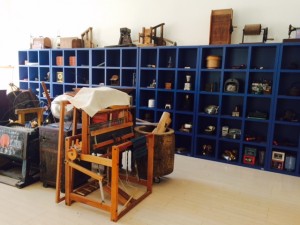
{The collection of inspiring antiques found in the non-electric workshop.}
While we were listening to all of this, I couldn’t help but think of the Marxist alienation we have talked about a bit in our class. Marxist alienation is the idea that we are separated from the value of our labor through capitalism and specialization. Instead of consuming all of the value we labor to produce, or even bartering the value we produce for the value someone else has produced, we define all value in monetary terms, we specialize for increased efficiency, and thus we alienate ourselves from the value we create and arguably also the value we intake. I think that this concept relates to what Hidenka Kobo is doing (or attempting to do). In a sense, through Marxist alienation, we give up some satisfaction for convenience. As mentioned previously, Hidenka Kobo is taking some of this convenience away in order to reduce our alienation from our energy sources and thus not abuse them so thoroughly. And this is similar to the organic farms we have visited this month as well- all are tying the value back closer to the labor- maybe not all the way, but closer than many alternatives.
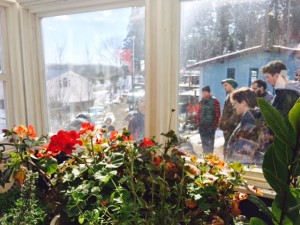
{The view from within an alternatively built bright red and blue greenhouse.}.
And even more broadly, I think I am starting to see a connection between the ideas of sustainability and proximity to the value of our labor. As Raymond Epp discussed in his lecture he gave us during our first week in Japan, the more globalized we get in our systems of economics and relationships, the more there is a chance of loose ends being forgotten and producing waste or even suffering in some sense. But when systems are kept tight, close knit,, and local, value can be tracked and thus leak out of the system less making it a more sustainable system in the long run, producing less waste while also wasting less value. I am still unsure how these ideas might fit together, but in experiencing this regression of a usually quite present Marxist alienation on this non-electric field trip in addition to in our experiences with organic farms, I think I am beginning to see a vague outline of interconnectedness and can thus add this potential detail to my in-progress definition of what environmental sustainability means to me.
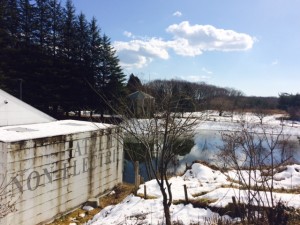

Recent Comments